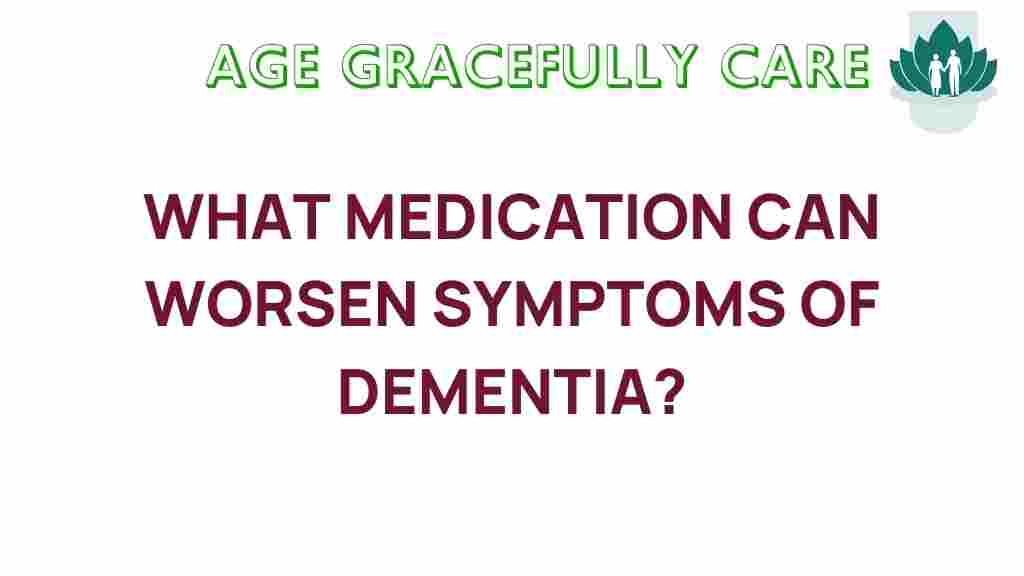Unveiling the Hidden Dangers: Medications That May Worsen Dementia Symptoms
Dementia is a term that encompasses a range of cognitive impairments, significantly impacting memory, thinking, and social abilities. As the population ages, the prevalence of dementia, especially Alzheimer’s disease, has risen dramatically. While medications play a crucial role in managing symptoms, some prescription drugs can inadvertently worsen dementia symptoms, leading to increased cognitive decline and health risks. Understanding the intersection of medications and dementia is vital for ensuring patient safety and maintaining mental health.
Understanding Dementia and Its Symptoms
Dementia is not a specific disease but rather an umbrella term for a variety of neurological conditions that cause cognitive decline. Alzheimer’s disease is the most common form of dementia, accounting for approximately 60-80% of cases. The symptoms of dementia can vary widely but typically include:
- Memory loss
- Difficulty communicating
- Challenges in reasoning and problem-solving
- Disorientation to time and place
- Changes in mood and behavior
Common Medications Prescribed for Dementia
Several medications are commonly prescribed to help manage dementia symptoms, including:
- Cholinesterase inhibitors: Such as donepezil and rivastigmine, which aim to improve communication between nerve cells.
- Memantine: Often used for moderate to severe Alzheimer’s, it works by regulating glutamate levels.
- Antidepressants: To manage symptoms of depression that often accompany dementia.
While these medications can provide relief, it’s crucial to recognize that not all drugs are beneficial for dementia patients. Some medications may exacerbate symptoms or contribute to cognitive decline.
The Hidden Dangers of Certain Medications on Dementia
Many common prescription drugs have been linked to adverse neurological effects in older adults, especially those with dementia. Here are some categories of medications that may worsen dementia symptoms:
1. Anticholinergics
Anticholinergic medications, often prescribed for allergies, sleep disorders, and gastrointestinal issues, can worsen cognitive decline in dementia patients. Some common anticholinergics include:
- Diphenhydramine (Benadryl)
- Atropine
- Scopolamine
Studies indicate that long-term use of anticholinergic drugs is associated with an increased risk of dementia and cognitive impairment. These medications block the neurotransmitter acetylcholine, which is critical for memory and learning.
2. Benzodiazepines
Benzodiazepines are often prescribed for anxiety and sleep disorders. However, these medications can have significant neurological effects, particularly in older adults. Common benzodiazepines include:
- Lorazepam (Ativan)
- Diazepam (Valium)
- Alprazolam (Xanax)
Research shows that benzodiazepines can lead to increased sedation, confusion, and a higher risk of falls and accidents, further endangering the safety of dementia patients.
3. Opioids
Opioids are powerful pain relievers that can also have detrimental effects on cognitive function. While they may be necessary for pain management, their use in dementia patients must be closely monitored. Examples include:
- Oxycodone
- Hydrocodone
- Morphine
Opioids can cause sedation, confusion, and impaired thinking, which can exacerbate dementia symptoms and increase health risks.
4. Antipsychotics
Antipsychotic medications are sometimes prescribed for behavioral issues associated with dementia, such as aggression and agitation. However, their use is controversial due to potential side effects, including:
- Increased risk of stroke
- Higher rates of mortality in elderly patients with dementia
Examples of antipsychotics include risperidone and olanzapine. Their neurological effects can significantly worsen cognitive decline and compromise patient safety.
Steps to Ensure Patient Safety and Mental Health
As caregivers and healthcare providers, it’s our responsibility to advocate for the safety and well-being of dementia patients. Here are some steps to consider:
1. Review Medications Regularly
Regular medication reviews with a healthcare provider can help identify any prescriptions that may be contributing to cognitive decline. Discussing the risks and benefits of each medication is crucial.
2. Explore Alternative Treatments
Consider non-pharmacological interventions for managing symptoms of dementia. These may include:
- Cognitive behavioral therapy
- Mindfulness and relaxation techniques
- Physical exercise programs
These alternatives can help improve mental health without the associated risks of certain medications.
3. Educate Caregivers and Family
Education is key to patient safety. Caregivers and family members should be informed about the potential dangers of certain medications. Resources like the Alzheimer’s Association offer valuable information on managing dementia.
4. Monitor for Side Effects
Vigilant monitoring for any changes in behavior or cognitive function can help identify adverse reactions to medications early. If worsening symptoms arise, consult with a healthcare professional immediately.
Troubleshooting Tips for Medication Management
Managing medications in dementia patients can be challenging. Here are some troubleshooting tips:
1. Keep a Medication Log
Maintaining a detailed log of all medications, dosages, and administration times can help track changes and side effects effectively.
2. Communicate Openly with Healthcare Providers
Ensure open lines of communication with healthcare providers. Share any observations regarding the patient’s cognitive health or behavioral changes.
3. Seek Second Opinions
If unsure about a prescribed medication, don’t hesitate to seek a second opinion from another healthcare professional specializing in geriatrics or neurology.
4. Involve Family Members
Engaging family members in discussions about medication management can provide additional support and insights. They can help monitor changes and advocate for the patient’s needs.
Conclusion
In conclusion, understanding the complex relationship between medications and dementia is essential for patient safety and mental health. While certain medications are necessary for managing symptoms, it is crucial to recognize those that may worsen dementia symptoms or contribute to cognitive decline. Regular reviews, alternative treatments, and vigilant monitoring can help mitigate health risks associated with prescription drugs. By staying informed and proactive, caregivers and healthcare providers can work together to ensure the best possible care for individuals living with dementia.
For more information on dementia and medication management, check resources from the Alzheimer’s Association or consult with a healthcare professional.
This article is in the category Health and created by AgeGracefullyCare Team
